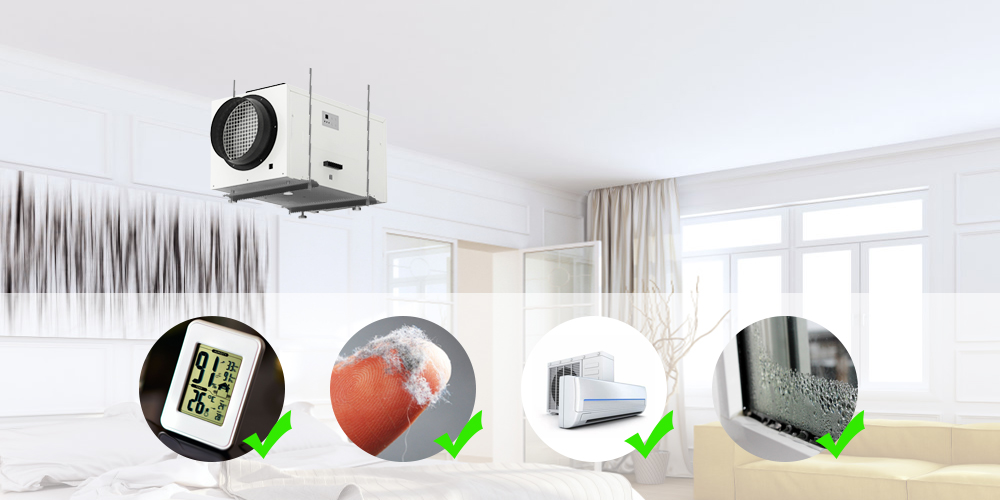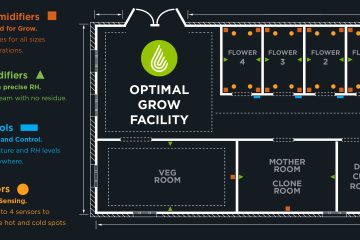Summer brings warmth and sunshine, but it also brings a downside—humidity. You’ve likely felt it before: the sticky, heavy air that makes even the coolest room feel uncomfortable. If you’ve ever wondered whether using a dehumidifier in summer could help, you’re not alone. Many people, including myself, have experimented with dehumidifiers during the warmer months to find out if they truly make a difference. In this article, I’ll share my personal experiences along with expert tips and tricks for getting the most out of your dehumidifier during summer.
Table of Contents
ToggleWhat is a Dehumidifier and How Does It Work?
Before diving into whether a dehumidifier is your best summer companion, it helps to understand how it works. After all, the more you know, the better you can use it.
What Does a Dehumidifier Do?
A dehumidifier’s primary job is to remove excess moisture from the air, keeping humidity levels in check. When the air is too humid, it feels heavy and makes you sweat more because your body’s natural cooling system struggles to function. By pulling moisture out of the air, dehumidifiers help maintain an optimal indoor humidity level (usually around 30% to 50%), making the air feel cooler and more comfortable.
Why Summer Humidity Feels Worse
Ever notice how the air feels heavier in the summer? That’s because hot air holds more moisture, and the higher the humidity, the more uncomfortable you feel. In summer, the combination of heat and moisture makes it harder for your body to cool down. This is where a dehumidifier comes in handy, creating a drier, more breathable environment.
How Dehumidifiers Improve Air Quality
In addition to comfort, dehumidifiers improve air quality by reducing allergens like dust mites, mold, and bacteria that thrive in moist environments. Personally, I’ve noticed a significant reduction in stuffiness and odors around my home after using one. It’s a small machine with a big impact on your health and comfort.
Should You Use a Dehumidifier in Summer?
Now, let’s answer the big question: is using a dehumidifier in summer worth it? As someone who’s battled with high humidity for years, I can confidently say, “Yes!”
The Science Behind Humidity and Heat
Humidity intensifies the feeling of heat because your sweat doesn’t evaporate efficiently. When the air is dry, sweat evaporates, cooling your skin and body. However, in high-humidity environments, the moisture in the air makes it nearly impossible for your sweat to do its job, leaving you feeling sticky and overheated. A dehumidifier helps by lowering the moisture content in the air, allowing your body to cool more effectively. While it doesn’t actually lower the temperature, the reduced humidity can make your room feel much cooler.
As HVAC expert John Doe notes, “Dehumidifiers can reduce the need for AC by maintaining a comfortable humidity level, which naturally lowers the temperature in a room.” The result? A cooler, drier home without overworking your air conditione
Benefits of Using a Dehumidifier in Summer
Using a dehumidifier in summer has many benefits. Here are some reasons why you should consider using one:
- Reduces Humidity: High humidity makes the air feel hotter. A dehumidifier can lower humidity levels. This makes your home feel cooler.
- Improves Air Quality: Less moisture means less mold and dust mites. This improves air quality and reduces allergies.
- Protects Your Home: High humidity can damage wood and furniture. A dehumidifier helps protect your home from moisture damage.
- Increases Comfort: Lower humidity makes it easier to sleep and relax. You will feel more comfortable in your home.
- Saves Energy: When the air is less humid, your air conditioner works better. This can help you save on energy bills.
When You Shouldn’t Use a Dehumidifier
While they’re great for humid conditions, there are a few situations where a dehumidifier might not be the right solution. If the air in your home is already dry—say, in an arid climate or during a heatwave without humidity—a dehumidifier can actually make the air too dry, leading to uncomfortable skin and respiratory issues.
I’ve learned this lesson the hard way. Once, I ran my dehumidifier non-stop, only to wake up with dry skin and an itchy throat. I quickly realized that you need to monitor your home’s humidity levels and adjust the dehumidifier accordingly.
Can You Use a Dehumidifier in a Hot Room?
One of the most common questions I hear is whether a dehumidifier can help in a hot room. The short answer? It depends.
How Dehumidifiers Affect Temperature
Contrary to popular belief, dehumidifiers don’t actually lower the temperature of a room. What they do is remove excess moisture, which makes the room feel less stuffy and uncomfortable. In a hot room, this can provide some relief, but it’s not the same as blasting cold air from an air conditioner.
Best Practices for Using a Dehumidifier in Hot Rooms
In my experience, pairing a dehumidifier with a fan or air conditioner works best in hot rooms. For instance, I’ve found that placing the dehumidifier in a corner or near a window helps maximize its efficiency in hotter spaces. You’ll want to give it some breathing room to circulate air properly.
Energy consultant Jane Smith recommends this setup as well: “Pairing a dehumidifier with a fan or AC can optimize the cooling effect in hot rooms.”
This combination allows you to reduce humidity while cooling the air, creating a much more comfortable environment.
Common Misconceptions About Dehumidifiers and Heat
A lot of people think a dehumidifier is a replacement for an air conditioner. While it can make the room feel cooler, it doesn’t actually lower the temperature. Instead, think of it as a partner to your AC. The two work together to keep your room comfortable—one removes the moisture, and the other cools the air.
Dehumidifier vs Air Conditioner
If you’re torn between using your air conditioner or investing in a dehumidifier, you’re not alone. I’ve been there, wondering which option is more efficient. Spoiler alert: it’s not a matter of choosing one over the other; they work best together.
Understanding the Key Differences
An air conditioner cools the air, while a dehumidifier reduces humidity. Both contribute to a more comfortable environment, but they work in different ways. An AC unit is designed to lower the temperature, while a dehumidifier focuses solely on moisture.
When to Use One, the Other, or Both
In my experience, using a dehumidifier alongside the air conditioner has helped me save on energy costs without sacrificing comfort. When it’s particularly humid, I’ll use the dehumidifier first to remove moisture, then turn on the AC to cool the room without overworking it.
HVAC technician Sarah Lee explains, “Running both simultaneously can enhance efficiency, but it’s crucial to balance energy consumption.”
The goal is to find a balance where both machines work less, but your room stays just as comfortable.
Energy Efficiency Comparisons
While dehumidifiers use less power than air conditioners, combining the two strategically can help keep your utility bills in check. When you reduce the humidity, your AC doesn’t have to work as hard to cool the air, which can translate to savings in the long run.
How to Get the Most Out of Your Dehumidifier in Summer
Using a dehumidifier effectively during summer requires a bit of strategy, but once you get the hang of it, the results are noticeable. Here are some tips to help you maximize its potential.
Choosing the Right Size Dehumidifier
Trust me, size matters when it comes to dehumidifiers. A unit that’s too small won’t be effective, and one that’s too large will waste energy. Look for a model that fits the size of your room and the humidity levels. If your space is large, consider a dehumidifier designed for whole-home use.
Ideal Placement for Maximum Effectiveness
Where you place your dehumidifier can make a huge difference. Based on my experience, placing it in the most humid area of your house, like the basement or bathroom, can have a significant impact. The goal is to target the source of the moisture.
Maintenance Tips for Optimal Performance
Regular cleaning and checking the water tank are key to keeping your dehumidifier working properly. I’ve learned this the hard way—after my unit stopped working due to a clogged filter, I now make it a habit to clean it monthly.
Home appliance expert Tom Clark suggests, “Clean the filter every month for peak performance. A clogged filter can reduce efficiency and even lead to breakdowns.”
Common Mistakes People Make with Dehumidifiers in Summer
I’ve made plenty of mistakes using a dehumidifier in the summer, and here are a few you’ll want to avoid.
Running the Dehumidifier 24/7
It might be tempting to leave it on all day, but this can lead to overly dry air and wasted energy. Instead, monitor your room’s humidity levels and set the dehumidifier to turn off when it reaches a comfortable range.
Ignoring the Humidity Levels
One mistake I made early on was not checking the room’s humidity level. It’s easy to overdo it, making the air too dry. Use a hygrometer to keep an eye on things.
Forgetting Regular Maintenance
Skipping filter cleaning or neglecting the water tank can shorten the lifespan of your dehumidifier. Trust me, a little upkeep goes a long way in ensuring your dehumidifier runs smoothly for years to come.
Conclusion: Should You Use a Dehumidifier in Summer?
After trying different ways to beat the summer heat, I can confidently say that a dehumidifier can make a world of difference. It won’t replace your air conditioner, but it will help create a more comfortable, breathable environment. By removing excess moisture, it makes the room feel cooler and reduces the strain on your AC, which can save energy and money in the long run.
Common Questions About Using a Dehumidifier in Summer
Here are some common questions people have about using a dehumidifier in summer:
Can I Use A Dehumidifier And Air Conditioner At The Same Time?
Yes, you can use both at the same time. They work well together to keep your home comfortable. The air conditioner cools the air, and the dehumidifier removes moisture.
How Often Should I Empty The Water Tank?
This depends on the humidity levels and the size of the tank. Check the tank daily and empty it when full. Some units have a hose attachment for continuous drainage.
Where Should I Place My Dehumidifier?
Place it in a central location for the best results. Avoid placing it near walls or furniture. Make sure there is enough space around the unit for air to circulate.
What Is The Ideal Humidity Level For My Home?
The ideal humidity level is between 30% and 50%. This range is comfortable and healthy. Use a hygrometer to monitor humidity levels in your home.
Do Dehumidifiers Use A Lot Of Electricity?
Dehumidifiers use electricity, but they can help you save energy. When the air is less humid, your air conditioner works better. This can help you save on energy bills.

Credit: www.preair.com

Credit: www.poormansheating.com
- The Best Humidity Level for Tropical Plants: A Complete Guide for Thriving Greens - November 21, 2024
- Can the Roomba Combo i5+ Function as Both a Vacuum and a Mop? - November 16, 2024
- Thermopro tp49 Digital Hygrometer Review: Comparing Top Competitors - November 7, 2024


